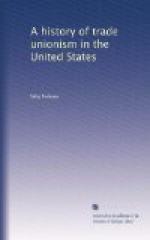Whatever reasons moved the trade unions of the skilled to battle with the Order for their separate and autonomous existence were bound sooner or later to induce those craftsmen who were in the Order to seek a similar autonomy. From the very beginning the more skilled and better organized trades in the Knights sought to separate from the mixed “district assemblies” and to create within the framework of the Order “national trade assemblies."[26] However, the national officers, who looked upon such a move as a betrayal of the great principle of the solidarity of all labor, were able to stem the tide excepting in the case of the window glass blowers, who were granted their autonomy in 1880.
The obvious superiority of the trade union form of organization over the mixed organization, as revealed by events in 1886 and 1887, strengthened the separatist tendency. Just as the struggle between the Knights of Labor and the trade unions on the outside had been fundamentally a struggle between the unskilled and the skilled portions of the wage-earning class, so the aspiration toward the national trade assembly within the Order represented the effort of the more or less skilled men for emancipation from the dominance of the unskilled. But the Order successfully fought off such attempts until after the defeat of the mixed district assemblies, or in other words of the unskilled class, in the struggle with the employers. With the withdrawal of a very large portion of this class, as shown in 1887,[27] the demand for the national trade assembly revived and there soon began a veritable rush to organize by trades. The stampede was strongest in the city of New York where the incompetence of the mixed District Assembly 49 had become patent. At the General Assembly in 1887 at Minneapolis all obstacles were removed from forming national trade assemblies, but this came too late to stem the exodus of the skilled element from the order into the American Federation of Labor.
The victory of craft autonomy over the “one big union” was decisive and complete.
The strike activities of the Knights were confessedly a deviation from “First Principles.” Yet the First Principles with their emphasis on producers’ cooperation were far from forgotten even when the enthusiasm for strikes was at its highest. Whatever the actual feelings of the membership as a whole, the leaders neglected no opportunity to promote cooperation. T.V. Powderly, the head of the Order since 1878, in his reports to the annual General Assembly or convention, consistently urged that practical steps be taken toward cooperation. In 1881, while the general opinion in the Order was still undecided, the leaders did not scruple to smuggle into the constitution a clause which made cooperation compulsory.




